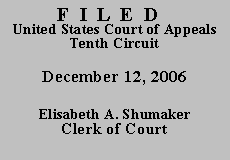

| JAMES SHERRILL, |
|
| v. | |
| COMMANDANT, USDB; COLLEEN L. MCGUIRE, |
BACKGROUND
A general court martial convicted Mr. Sherrill of absence without leave, indecent acts upon a minor, two specifications of indecent liberties upon a minor, desertion, and disorderly conduct. For these crimes, Mr. Sherrill received a sentence of dishonorable discharge and twelve years incarceration. On appeal, the Army Court of Criminal Appeals ("ACCA") dismissed a finding of indecent liberties on a minor but affirmed the remaining findings and sentence.
Mr. Sherrill filed a petition for habeas corpus in 2002. The district court denied the petition and this Court affirmed. Sherrill v. Commandant, USDB, 118 F.App'x. 384 (10th Cir. 2004). Following the Supreme Court's denial of Mr. Sherrill's petition for certiorari, 544 U.S. 936 (2005), Mr. Sherrill filed a motion under Fed. R. Civ. P. 60(b) in the district court, seeking to reopen his habeas action and claiming that under Brown v. Sanders, 126 S. Ct. 884 (2006), his sentence was unconstitutional because it was based on an invalidated sentencing factor. The court denied the motion, noting that Brown provides "little support" for Mr. Sherrill's argument and also that the same issue was considered and denied in the original habeas proceeding.(2) R. Vol. I, Doc. 45, at 23.
Mr. Sherrill timely appealed.
DISCUSSION
"A district court has discretion to grant relief as justice requires under Rule 60(b), yet such relief is extraordinary and may only be granted in exceptional circumstances." Servants of Paraclete v. Does, 204 F.3d 1005, 1009 (10th Cir. 2000) (internal quotations marks omitted). We review a district court's denial of a Rule 60(b) motion for abuse of discretion. Id.
In Brown, the Supreme Court announced a new rule for evaluating the effect of the invalidation of sentencing factors in capital cases. The Court held that
[a]n invalidated sentencing factor (whether an eligibility factor or not) will render the sentence unconstitutional by reason of its adding an improper element to the aggravation scale in the weighing process unless one of the other sentencing factors enables the sentencer to give aggravating weight to the same facts and circumstances.
Brown, 126 S. Ct. at 892. Mr. Sherrill, reasoning from Brown, argues that because the ACCA dismissed a finding of indecent liberties upon a minor, his sentence--which issued before that dismissal--was based upon an invalidated sentencing factor. He also argues that Brown ushered in a new standard of review for claims such as his, and that the ACCA's review of his sentence was therefore invalid.
We agree with the district court that Brown lends little support to Mr. Sherrill's argument. Brown concerned the specific jurisprudence surrounding capital sentencing, and absent guidance from the Supreme Court, we will not expand its holding beyond that realm. Accordingly, Mr. Sherrill's claim is unchanged from the general objection to the ACCA's reassessment of his sentence that both the district court and this Court considered and rejected when reviewing his habeas petition. We held that "[i]f the military courts have fully and fairly reviewed Sherrill's claims, we cannot review them." Sherrill, 118 F.App'x. at 385 (citing Roberts v. Callahan, 321 F.3d 994, 995 (10th Cir. 2003)). We found that the military courts had, in fact, "fully and fairly considered Sherrill's claims that he was denied due process in reassessing his sentence," and thus held we could not review the claim. Id. at 386. We stand by that ruling and thus must affirm the denial of Mr. Sherrill's Rule 60(b) motion.
CONCLUSION
The judgment of the United States District Court for the District of Kansas is AFFIRMED.
Entered for the Court,
Michael W. McConnell
Circuit Judge
*.After examining the briefs and appellate record, this panel has determined unanimously that oral argument would not materially assist in the determination of this appeal. See Fed. R. App. P. 34(a)(2); 10th Cir. R. 34.1(G). This case is therefore submitted without oral argument. This order and judgment is not binding precedent except under the doctrines of law of the case, res judicata and collateral estoppel. It may be cited, however, for its persuasive value consistent with Fed. R. App. P. 32.1 (eff. Dec. 1, 2006) and 10th Cir. R. 32.1 (eff. Jan. 1, 2007).
2.The district court also found moot Mr. Sherrill's request for a stay and abeyance pending his transfer between correctional facilities. Mr. Sherrill does not argue that this ruling was in error.